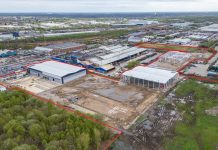Dean Watson, Joint Managing Director at national property and construction consultancy Wakemans, warns that key issues could stifle UK construction industry growth.
As the General Election campaign takes shape, the Conservatives look set to reinforce their plans regarding access to the single market and the free movement of workers into and out of Europe, while Labour and the Liberal Democrats are expected to campaign for a soft Brexit. One thing is clear: a healthy construction industry is vital if the political parties are to deliver on their manifesto promises when it comes to housing, schools and infrastructure projects.
The overall indications for future growth in the construction sector look good. According to the Construction Products Association’s (CPA) latest forecasts, output is projected to rise by 1.3% this year and 1.2% and 2.3% in 2018 and 2019 respectively. On closer examination, however, the worry is that this growth will not be uniform across all sectors but will instead be concentrated in a couple of areas.
Infrastructure projects in the energy, rail and water sectors, including Hinckley Point C and HS2, are set to fuel growth driven by the £300million National Infrastructure and Construction Pipeline. Thanks to demand from buyers looking to get on to the property ladder and Help to Buy equity loans, private housebuilding is also on target to support construction growth, rising by 7.2% between 2017 and 2019 according to the CPA.
That said, Help to Buy is scheduled to end in 2021 so cannot be considered a long-term solution. In light of this, the housebuilding sector is eager to receive clarification, and it needs to come sooner rather than later, as to what measures the government will introduce to provide the necessary stimulus for continued growth.
If infrastructure and housebuilding projects represent the upside, the counterbalance is that there will be fewer commercial and industrial projects such as offices and factories. After a 1% dip this year, the CPA projects a further 12% fall in office building in 2018, while the construction of factories is expected to decrease by 5% this year and 4% in 2018.
Rising costs
One of the key factors that could put the brakes on growth has to be costs. Construction prices rose throughout 2016, and with government indices reporting that input costs for goods bought and sold by UK manufacturers are increasing faster than at any time since 2008, more rises in construction prices are to be expected.
Raw materials will be a key driver of rising prices. Between the final quarter of 2016 and the first quarter of this year the average cost of building materials rose by 2.5%, which is equivalent to 10% on an annualised basis. Despite its recent rally, the weaker pound will affect imports, with metal prices showing the biggest increase.
There is plenty of evidence that the devaluation of sterling is starting to push up prices in the wider economy and prolonged currency weakness makes it inevitable that construction costs will rise in accordance with higher rates of inflation.
Further pressure is expected to come from labour rates, which rise annually. As employers contend with the Apprentice Levy and the National Living Wage, wage increases would not only be fuelled by higher inflation, but would also be impacted by the ongoing skills shortage.
Skills crisis
The skills crisis is a longstanding problem and is unlikely to be easily resolved. Nevertheless recent developments look promising as there is the hope of support from the regional growth hubs, enterprise partnerships and initiatives like the Midlands Engine Strategy. Designed to boost growth by investing in skills, transport and innovation while also attracting inward investment from around the world, they are a potential source of much-needed funding for construction industry training.
The plight of EU nationals happily settled here and in employment is already emerging as a key platform for Brexit negotiations and is likely to feature heavily in election debates. Meanwhile, the recruitment of migrant workers resonates strongly with the construction sector, making it essential that the new government clarifies the UK’s visa policy.
In the coming 12 to 18 months it is more important than ever for builders, developers and owners to stay flexible about project procurement, finance and delivery. By guarding against uncertainty becoming a barrier to successful development, the industry should be well-placed to meet the challenges of the prevailing construction landscape post-Brexit.
Whatever the outcome of the General Election, the skills crisis, increasing wages, rising raw materials costs and the economic uncertainties surrounding Brexit must not be allowed to stifle construction industry growth.



















